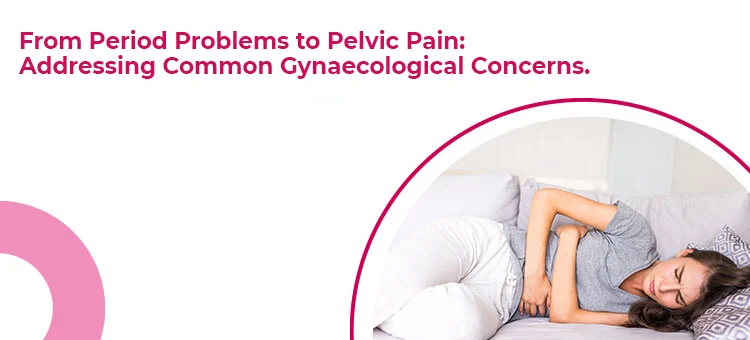Gynecological concerns, ranging from menstrual irregularities to pelvic pain, can significantly impact a woman’s physical and emotional well-being.
From the onset of menstruation to menopause and beyond, our bodies go through various changes and challenges. Knowing and informing your healthcare professional of your concerns is essential for your overall health and well-being.
Let us discuss the common gynaecological concerns facing females nowadays.
Period Irregularities:
Irregular periods are a common concern among women of all ages. Whether your periods are too frequent, irregular, or accompanied by heavy bleeding or severe pain, it is very important to pay attention to these symptoms.
Menstrual irregularities can be caused by hormonal imbalances, thyroid disorders, polycystic ovary syndrome (PCOS), stress, or any other underlying medical conditions.
If you are experiencing irregular periods, keeping track of your menstrual cycle and symptoms can provide valuable information for your healthcare provider.
Treatment options may include hormonal contraceptives, lifestyle modifications, or medication to regulate your menstrual cycle and relieve the associated symptoms.
PCOS:
PCOS is a complex hormonal disorder characterized by elevated levels of androgens (male hormones) in women. This hormonal imbalance disrupts the normal function of the ovaries, leading to irregular menstrual cycles, ovarian cysts, and various symptoms related to hormonal fluctuations.
The exact causes of PCOS are not fully known to us. Some of the factors contributing to PCOS can be genetics, hormonal imbalances, or lifestyle factors.
Symptoms of PCOS: irregular menstrual cycle, excessive hair growth, acne, weight gain, and ovarian cysts are the various symptoms seen in association with PCOS.
Pelvic Pain:
Pelvic pain is commonly referred to as discomfort in the lower abdomen, and it is frequently reported nowadays.
It is distinct from vaginal, vulvar, or perineal pain, which affects the external genital area.
Pelvic pain can be either acute or chronic; it’s classified as chronic if it lasts for 3 to 6 months.
It is essential to seek a medical evaluation if you are experiencing pelvic pain or any other associated symptoms. A professional healthcare provider may ask you to do diagnostic tests, such as pelvic ultrasound or laparoscopy, to identify the cause of your symptoms.
Treatment options for pelvic pain may include medical pain management strategies, medication, physical therapy, or surgical intervention, depending on the underlying condition.
Regular gynaecological exams, including pelvic examinations and collecting pap smears, can help detect abnormalities early and facilitate early treatment.
In addition to that, practising good personal hygiene, maintaining a healthy lifestyle, and avoiding risky behaviours, such as unprotected sex or smoking, can reduce the chance of having gynaecological issues.
If you have any gynaecological concerns, such as PCOS, irregular periods, etc; you can contact Cambridge Hospital directly to schedule an appointment with a specialist.


